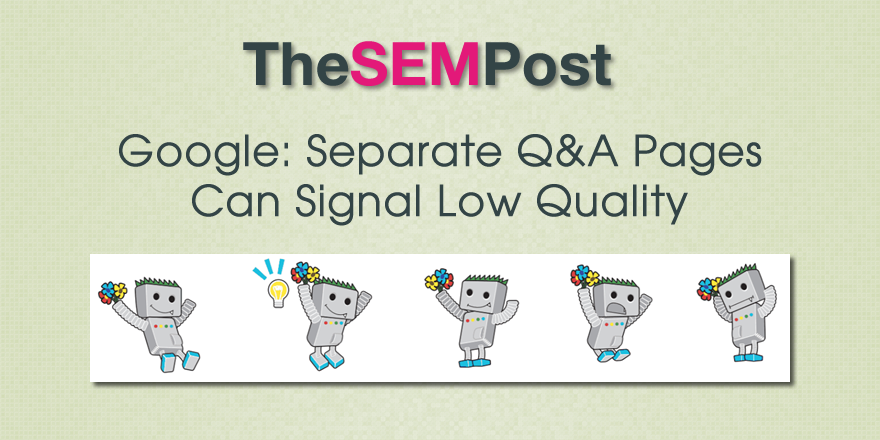 One of the easier ways sites look to expand the number of pages on their site is to take their FAQ or multi-topic pages and split them into individual pages. Google has commented that adding additional pages to a site can actually devalue the current pages on a site. And often, many site owners attempts to expand their site by placing this type of content on individual pages can backfire and reduce the quality.
One of the easier ways sites look to expand the number of pages on their site is to take their FAQ or multi-topic pages and split them into individual pages. Google has commented that adding additional pages to a site can actually devalue the current pages on a site. And often, many site owners attempts to expand their site by placing this type of content on individual pages can backfire and reduce the quality.
During the Reddit AMA last week, John Mueller cautioned site owners about these types of pages and how they can often instead be viewed as adding a lot of low quality pages and not as adding value to the site.
There are many sites that do break these out into individual pages. But they are all value added with things like lots of content, explanation videos, images, etc. They aren’t just a question with a one sentence answer, content that will have trouble ranking, especially if there are a lot of competitor pages that are higher quality.
One alternative is that if it makes more sense to have each of these on individual pages from a user perspective, you could noindex them or look to increase the content on those individual pages that are most important and that searchers might search for in Google rather than your site’s own site search or general FAQ page.
The other is to place it on a single page and allow users to expand the answers. With mobile first indexing, this type of set up is acceptable in the eyes of Google, and is quite commonly used on sites such as Wikipedia. This makes it a better user experience for visitors who can find what they are looking for much easier, and it also saves users from making multiple clicks to get a few points of information.
You could also split it down into sections, in a way that makes sense for your users, and have each section on an individual page. This would help situations where you might have so many Q&As that it becomes a poor user experience for someone trying to wade through and find what they are looking for.
You can rank for the featured snippet with these longer Q&A pages as well, so there is no need to try and artificially inflate content for individual pages, as long as you ask and answer the question in the longer page.
Here is the full quote:
I’d try to combine this into the article pages themselves. Making separate pages for each Q&A seems like you’d be generating a lot of lower-quality pages rather than improving the quality of your site overall.
Jennifer Slegg
Latest posts by Jennifer Slegg (see all)
- 2022 Update for Google Quality Rater Guidelines – Big YMYL Updates - August 1, 2022
- Google Quality Rater Guidelines: The Low Quality 2021 Update - October 19, 2021
- Rethinking Affiliate Sites With Google’s Product Review Update - April 23, 2021
- New Google Quality Rater Guidelines, Update Adds Emphasis on Needs Met - October 16, 2020
- Google Updates Experiment Statistics for Quality Raters - October 6, 2020